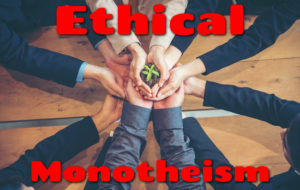
Ethical monotheism is at the core of what the Reform movement of Judaism is and stands for and basically means the G-D is the cornerstone of our moral compass. Judaism is the first religious group to advocate and propagate human rights and equality, caring for all people, the planet, charity for the needy, and treating everyone with respect, kindness, and decency. Ethical monotheism is the reason behind these aspects and within the Reform movement, it is the reason behind our social justice work as well. Ethical monotheism states that if one is suffering we all are, if one is in need, we all are, if one is oppressed, we all are, and it is our job to try to help alleviate the conditions.
Every week Jews put money in a Tzedakah box just before the Shabbat, and once it has accumulated, the money is donated to some form of charity. Ethical monotheism also means right conduct, that is treating others as you’d desire to be treated, help them if they need help, and show them kindness.
“Love your neighbor as yourself” (Leviticus 19:18)
The quote from Leviticus is the proverbial golden rule of Judaism and lays the framework for all interactions amongst all people. Acting within righteousness towards others, shining the light upon those who need it, without preaching to them or holding ulterior motives (such as for photo ops or ego aggrandizement) is pivotal towards ethical monotheism. This coincides with worship and the ceremonies and directly, each aspect influences one another.
The ethics and morals found within Judaism are seen as sacred mandates handed directly from G-D and the Torah. All whom practice Judaism are required to live by those sacred mandates/commandments and not to waver from them. Ethical monotheism is where the interpersonal lives of Jews intersect with the religion of Judaism.